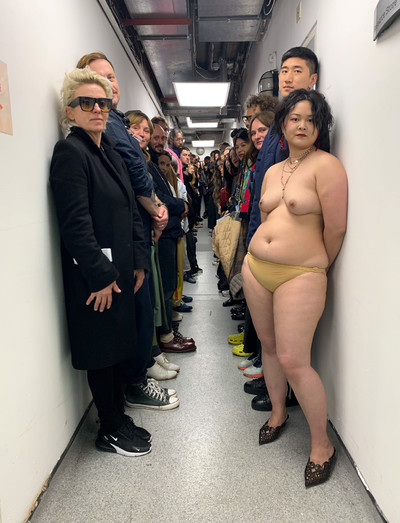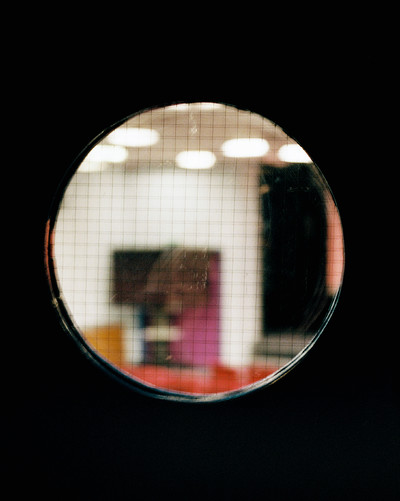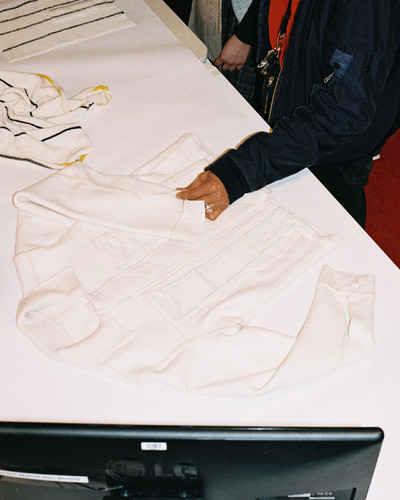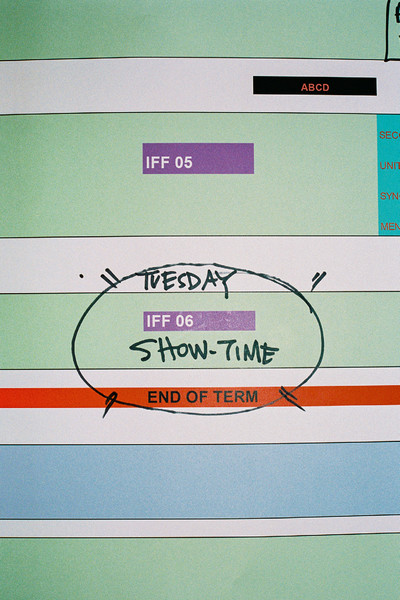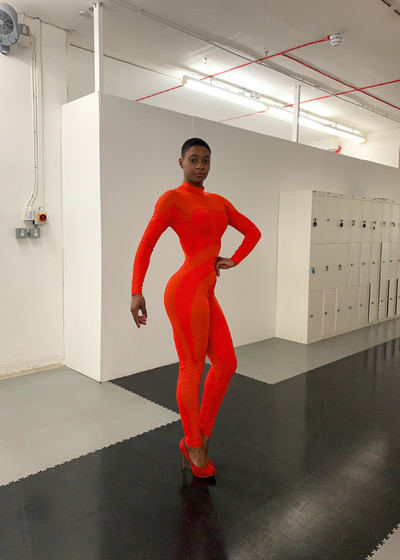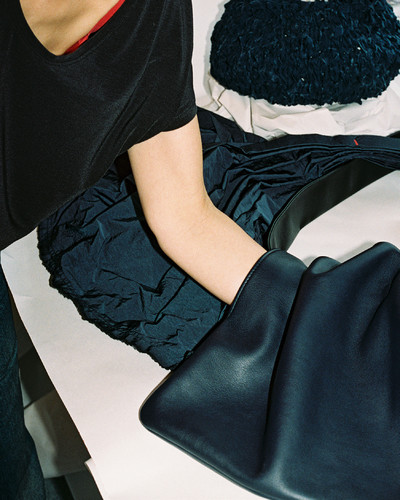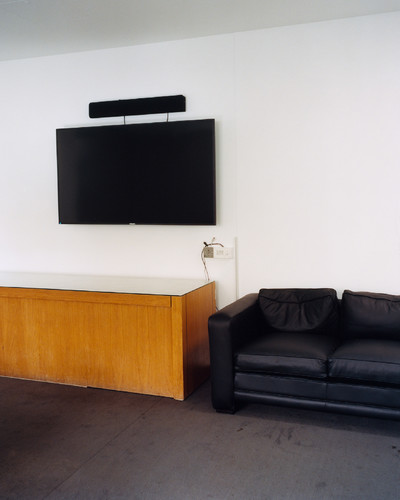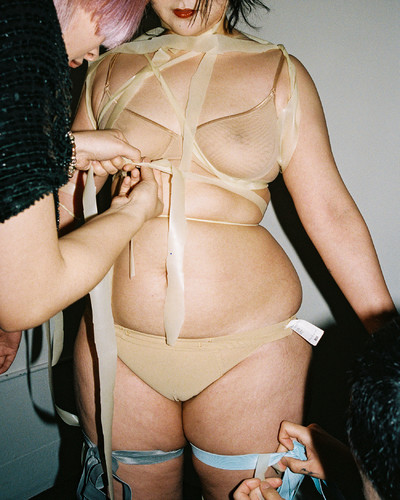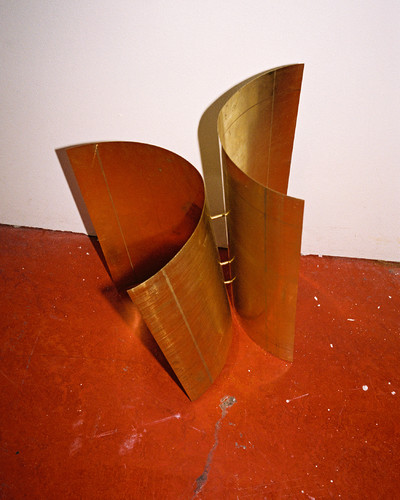The Fashion MA’s freethinking director encourages her students to transcend the conventions of the ‘graduate collection’, pushing them to question their own identity, values, and aesthetic choices on a deeper level.
By Jorinde Croese
Photographs by Oliver Truelove
Videos by Rafa Yuste
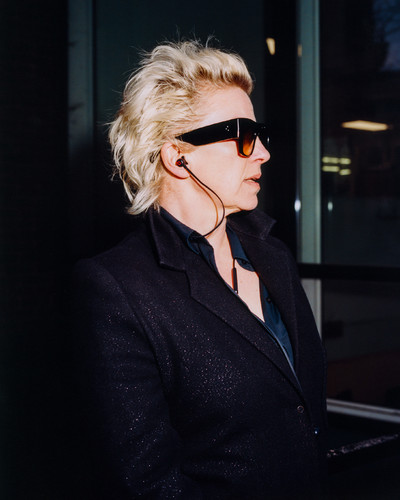
In between the Royal Albert Hall, a handful of embassies, the V&A and the Natural History Museum is a hotbed of radical conceptual thinking: the Royal College of Art. It is housed in a striking 1962 Modernist building that sits unexpectedly among these London landmarks and feels almost like a strategic move to draw creative reactions from generations of thinkers and makers. Founded in 1832 as the Government School of Design, it was renamed the RCA in 1896 and has since trained a who’s who of British creativity, from artists including Barbara Hepworth, Ian Dury, Bridget Riley, Ridley Scott, David Hockney, and Tracey Emin, to fashion designers such as Zandra Rhodes and Ossie Clark, and more recently, Erdem Moralioglu, Bianca Saunders, and Supriya Lele.
Today, the RCA continues to offer a wide range of courses – from intelligent mobility to environmental architecture, curation to creative leadership, jewellery design to digital direction – and prides itself on a multidisciplinary and dedicated approach to conceptual and radical thinking. This ethos is perfectly embodied in the Fashion MA, in large part thanks to Zowie Broach, its gregarious and freethinking director since 2014. The co-founder of avant-garde design studio and brand Boudicca in 1997, she encourages her students to transcend the conventions of the ‘graduate collection’, pushing them to question their own identity, values, and aesthetic choices on a deeper level. The result is that fashion at the RCA today is no longer solely about clothes, but instead a far-reaching and holistic investigation of the meaning of creativity itself.
Zowie Broach is a force of nature. Eight years as head of the MA fashion programme at the Royal College of Art have done nothing to dim her energy, still as high as when I first interviewed her about the role in 2014. Intellectually sharp and conceptually deep, she has a profound empathy and care for her students, whom she treats like family, but isn’t afraid to challenge. In her role, Broach is able to draw on her own design story – she co-founded avant-garde design studio Boudicca, with Brian Kirkby in 1997 – while keeping her eye firmly on both present and future. This brings a relevance to the curriculum and avoids it getting stuck in a ‘this is what we’ve always done’ mentality. As an educator, Broach embraces fluidity of gender and identity, the merging of the physical and the digital, and bringing together different fields within the RCA to create new futures and thought processes that go beyond the usual graduate collections or fashion practices. You can feel this tangibly in the end-of-programme shows, which often feel engaging and immersive, prompting engagement with the ideas behind the clothes. Broach and I sat down on a white leather sofa, tucked away in a corner of the RCA’s fashion studios, and began our discussion about finding the right tools to instigate profoundly radical change, and how, as Broach says, ‘no one wants disruption until they are ready for it’.
While change can feel necessary, it’s still not happening at the speed we need today.
Zowie Broach: Yes, it is interesting to think about our relationship with the planet. Nature changes constantly and does it very well. It’s about life and death, survival and community and connectivity. Maybe it’s about us becoming closer, understanding and thinking about agriculture and locality. One of the things I struggle with is understanding the scale of the MA that I look after. I did a talk at the Parsons MA [in New York] and there were maybe eight or nine students. I was just like, ‘Wow, I have nearly 130-150 students! I must be running the only fashion MA course in the world that has this many people!’ When you interviewed me when I first arrived at the RCA we probably had 50 students across the 2 years who were split into year groups and branched into other colleges, where they then might have been broken down into even smaller groups. Then we merged all of that in October 2015 when we moved downstairs in the building. That was important.
So the different courses, menswear, womenswear and footwear, all merged?
Zowie Broach: Yes. When I first arrived, there was this whole early debate around gender that had come out of America. You realized even then that there was this shift beginning to open up around identity. In the times we are in, you cannot just be binary. When we moved downstairs, we started doing these talks at the beginning of the year to bring in all these different practices and disciplines. We started bio-digital platforms and systems that allowed people to have a practice while also exploring new perspectives relevant to the time we’re living in. It’s not just fashion school or finishing an MA that takes you into the industry; there are all these other disciplines and ways of thinking. For me, with where I come from, it was never going to be about being traditional, and I’m very proud of how we are the only programme in the whole college that allows students to title their practice. Sometimes they are traditional, and sometimes they are more out there testing the waters, because language is so limiting, in a way. Take the word ‘fashion’ or ‘modern’: all these words have been overused and are removed from a position of where they have truth. Saying ‘I’m a fashion designer’ is not enough any more for most people; they need to use different words and describe it in different ways. That’s important for me and that comes back to their individual practice and agency. It’s about their understanding of self and not being part of what exists but of where we’re going to be led by them going forward. That means they have to have an independent vision and articulation.
Can you give me an example of what people have called their practice?
Zowie Broach: A student from last year called herself a ‘bio-activist designer’. She made clothes and used bio material, but activism was also very important to her. She was also really into questioning the relationship between us, the material of nature, and our choices. And then we have had other people, like a student from two or three years back who joined Extinction Rebellion and activism became her MA. Other people are using bio in their practice, but they might not have chosen a title.
What differentiates this MA programme from other schools’?
Zowie Broach: I can’t do a comparison because I don’t know the other schools well enough. What matters most to me is whether students at the end of their time here understand themselves. That’s the most important thing you can offer someone – and it’s so simple and yet so complex. It’s about finding a complete language and elegant, graceful confidence. The industry is noisy and confusing, and you can have a good product, but if you don’t understand your core identity and why you make choices, things that might seem the right thing to do later turn out to be the wrong call. The students make and design and there are lots of practicalities, but the essence – and what I am most interested in – is about them understanding themselves and being able to articulate change. This idea of change is really important. I want them to make change, to lead change. They are the creative leaders of our future and that becomes really empowering for them. That gives you more of a sense of purpose.
How do you get people to dig deep and find that?
Zowie Broach: I run a funny project called ‘Mirror Mirror’; it’s the only thing I run actually. Bizarrely I wrote it for Shelley Fox [Parsons MA fashion director] who, before she started at Parsons, was given a period of time to work out what the MA would be. The three or four years before I did this job, I would go to New York and run that project there. We start it on a Monday and on the Friday morning you present. It’s not about design; it’s about asking the students who they are. It’s hard to explain in practical terms why it works; there are no rules about what they should or shouldn’t do, but what is important is that it’s very fast and intuitive. I ask the students to be very focused that week, not do other projects or make appointments, and as much as you love your family or your partner or friends, they are out that week. I want them to examine their choices in life.
Is that difficult?
Zowie Broach: It is difficult for all of us to understand who we are; it’s a massively complex question. Whether it is the music you listen to, the books you read, whether you are young or old – you are surrounded by choices. Why do you make them? Do you make them consciously or are you just doing it without thinking? The really great designers understand everything they do. That is the line of your body, your voice, your language. When I say designers, they could be artists, creatives, from a dancer to a writer, the people who we admire are masters; they are so dedicated and focused. It’s not pretentious, it’s really beautiful, and a real passion for wanting to constantly learn. Some people do it effortlessly; for others it takes them their whole lives. It’s not like you need to know who you are after five days, but just thinking about those questions begins to stir something. It’s about trying to understand: when you sit at a table, how do you sit, where do you sit, which table do you choose, which chair? I always use a very simple example: if Margiela and Fendi had to present themselves by only using a piece of paper and a pencil, you would know immediately who they are. That’s about understanding those elements of your identity.
‘It’s not just fashion school or finishing an MA that takes you into the industry; there are now all these other disciplines and ways of thinking.’
Has anything changed in the years since you first created ‘Mirror Mirror’?
Zowie Broach: No, it is bizarrely really simple and really complicated. Some people don’t engage and then they miss out because then they struggle more; that’s what I see. It is about letting go and that’s hard for people.
Did you ever go through the ‘Mirror Mirror’ process yourself? If so, did it make you realize what was important to teach?
Zowie Broach: Retrospectively, I can see that there have been things that have defined me. I didn’t do an MA, and I wasn’t actually doing fashion; I was doing video direction and styling. I used to watch a lot of films and there was this amazing video store in Notting Hill, and over one weekend I watched every AlmodЧvar film. That was the first time I realized that someone’s language could be the same but different. I studied his work and enjoyed it, but then I realized something about his choices of different characters and the overarching questions that he was asking.
It does seem that a lot of students today have a planned trajectory, where they envision doing an MA after their BA. Have you noticed that change in the past two decades?
Zowie Broach: You used to be like the crème de la crème if you did an MA because there were so few courses. On one hand you could call it the commodification of education. On the other, you could say that it’s actually no different to being an architect or a lawyer, you need that time to define who you are. Maybe it’s a positive because understanding those early, mysterious stages of a practice can’t really be done in three years – and you don’t complete it after an MA either. It was also the democracy of education, it has become more available. I was on a BA with only 13 people in my year. There are some really phenomenal BAs where people are ready to go into industry afterwards, so it depends on the choices, and education is really important for some families and some cultures. Other people can go straight to industry and learn there.
Would you say that the majority of the people here want to start their own thing?
Zowie Broach: I think they would all love to; that is an instinct for sure. When you’re in it, you can’t think about other elements because you are here to craft your world, so I would say it’s a natural response. Then when you leave you have to return to the atmosphere of reality. Then it comes down to the essentialness of what an individual needs and whether they have the luxury of financial support or whether they have to get a job. There are so many different scenarios. Then I think that doesn’t stop people from doing their own thing and then going into industry; there are multiple variables. We see in China more and more people are starting their own labels; there’s a massive shift and that excites me. Same in Korea. Whereas London has had bucketloads of young designers forever, so maybe it’s now harder in this country. What is also interesting, and thanks to Covid this became even clearer, is that you don’t have to be based in London any more. I think it is also about people understanding time. Many actually need two or three years before they can say, ‘Yes, I’m doing my label.’ They do other things, they meet people, they think about it…
‘If Margiela or Fendi had to present themselves by only using a piece of paper and a pencil, you would know immediately who they are.’
What draws people here and to what you have created?
Zowie Broach: I would like to think they have seen people who have been here and what they see coming out of the college and have been impressed. Although we offer students a lot and there are lots of great people around the course, it is also about exchange and response. The response from the students is as much a part of the programme as the programme itself, and it is that interweaving that then delivers. I think that is different from other colleges. The other thing is that the college isn’t a fashion school; it has all these other disciplines. For some people it has a classic reputation and it is based in London; that all ticks some boxes. I would love to think that maybe others have noticed that it isn’t so traditional, that there was this freedom to explore, and they align to that.
You mention that ‘Mirror Mirror’ is the only thing you teach. What is your overarching role? Is it shaping the curriculum, updating it, looking at new staff to hire?
Zowie Broach: It’s very practical most of the time: keeping to deadlines, making sure that information is shared, putting out fires, dealing with complexities, being intuitive about where things are breaking or where things are growing, which has all been hard in Covid.
Because you are less there with the people?
Zowie Broach: At the beginning of Covid it was easy because everyone was in the same boat, but then it became so in and out, and changing constantly, and those variables are so hard to control. For me it’s very important to try and keep people grounded and positive in their attitude. If things are not right, we have to discuss it and do so in an elegant way; our lives are too intense and complex, and we’ve got to find a way of being. We all remember that first intense couple of months of lockdown and I really started to do a lot of yoga and meditation at that point. I had an amazing student, Natalia, and that was very much part of her practice, so I asked whether she would run a meditation course every Monday, which she did throughout her whole final year. I think once again this comes back to the idea of trying to work out size and scale and how I feel about that.
‘We have had a student from two or three years back who joined Extinction Rebellion and activism subsequently became her Fashion MA.’
Would you like to reduce the size of the student body?
Zowie Broach: It is not my choice, but actually we quite like the idea that it’s sticky and difficult because that’s what the world is. Some people have the luxury to be in much smaller scenarios with very few people, but mostly you’re going to have to deal with the complexity of size, whether you go to work at a big fashion house, FarFetch, or a big-tech gaming company. There are lots of scenarios you can go into where there are lots of people. Everyone is dealing with however many emails, texts, Instas, Signals – that’s the level of interaction we’re all dealing with now. It’s complex, especially when compared to the early 1990s when you’d just go home and listen to your answer-machine messages. I’ve thought about this idea of being in a community that is complex and difficult with lots of different international cultures and nationalities, but it can also be more local; being from Birmingham compared to Wales can be as complex as Angola compared to Shanghai. There is something soothing and very beautiful in that complexity – it’s just about how we handle it. It’s not all positive and there are going to be difficult times, but it makes me question and think about the whole scenario, rather than just numbers. You have to think about it creatively. There are loads of businesses of 150 people, so how do you manage that and what is the atmosphere that you want to have?
I imagine that you have chosen a strong team around you to create this culture and atmosphere.
Zowie Broach: We have these amazing mentors and my staff who also mentor. We’ve started to call it ‘mentor’ and not ‘tutor’ because it is different with an MA; it’s more about dialogue and support rather than teaching. They choose to be here. It is like this beautiful, creative, philosophical dialogue that can be very practical, as well as very opening and demanding.
Do you get time to do your own thing?
Zowie Broach: I’m meant to do that. I am really trying to focus on the digital. The expression of self in the digital is going to be one of the most beautiful places we can exist in, as long as we get it right. At the moment I’m reminded of the point I was at like 20 years ago when we were protesting and everyone else was like, ‘What are you talking about?’ because they were happy to move into capitalism. Where we are now in terms of the digital and the real, and that collision, is crucial and we have a great responsibility as creatives to understand how to make the right decisions. That fashion identity, the designing of self, is going to be a huge part of that. It’s not just fashion and products – it’s us. And that comes back to the one simple question: who are you?
